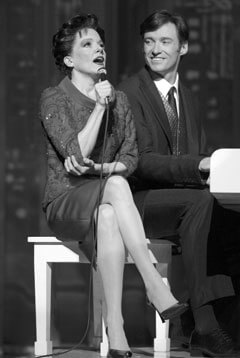Show biz caricatures never leave the stage in the life of Peter Allen
There is a profound and oceanic chasm between what separates a hit musical from a good musical, particularly in the current economy. “The Boy from Oz,” with a reported $10 million advance on a $9 million and mounting production price is going to be a hit musical, and there is nothing anyone can say about that.
On some levels, it should be—on the force of Hugh Jackman’s magnetic personality and astonishing performance, not to mention the superlative work by a company that’s consistently bursting with talent. And, judging by the audience reaction at the performance I saw, this show is going to be a smash on the order of “Mamma Mia!” (Not that that’s exactly something to celebrate from a critical perspective.)
And for “The Boy from Oz” being a “good” musical?
No, no, no.
Definitely not.
In fact, this is a terrible musical. But, as H.L. Mencken said, no one ever went broke underestimating the taste of the American people. Thus, the lazily crafted show on the stage of the Imperial is loud, colorful. and shiny and sports a patina of oily slickness to the extent that good seats are going to be hard to come by for months.
But come on! Couldn’t someone have done better with the life and music of Peter Allen than creating what is essentially a Vegas-style revue that reduces his life to a series of tedious vignettes? Admittedly, Martin Sherman, who wrote the book and is generally a good playwright, had an almost insurmountable challenge: how does one write a dynamic show about someone who never expressed emotion except through his music? That was the conceit of Allen’s character.
Mr. Sherman has almost been forced into a sequential recounting of major events of Allen’s life, to showcase the songs, with Mr. Jackman as Allen providing the lame segues that, more or less, start with, “and then I…”
So, first we see Allen come up from rural Australia in a not-so-good act. Then he meets Judy Garland in Hong Kong and later Liza Minnelli in New York when he’s opening for Judy. He marries Liza. He gets divorced. Then he comes out and meets a great guy, all the while working his way to stardom. Then his lover gets sick and dies. Then Allen gets sick. Then his lover comes back as a ghost. Then Allen goes home and learns the “dark secret” of why he can’t express emotion.
It’s just seems so clumsy, and the set-up for one of Allen’s big tearjerkers, “Don’t Cry Out Loud,” is so forced as to be laughable. In the end, the Minnelli character says to Allen, “We are show business.” They are indeed, and it’s not pretty.
The characters’ lack of introspection—a failure to look beneath the surface of anything—severs their ability to connect with the audience. Allen’s false attempts to put on the best face whatever comes along leaves one cold. A lot of rotten things happen, but mechanical responses and avoidance make dramatic tension impossible.
But enough carping. “The Boy from Oz” is what it is. As a songwriter, Allen was good, not great, as stringing together his songs makes abundantly clear. As a performer, he helped define an era for some segments of the population. Yet, aside from meeting celebrities and some luck, his life, at least as presented, was not very special. So be it.
What is special is the performance of Hugh Jackman who carries the evening. He struts his way through the numbers and seems to flirt with every member of the audience at once. Indeed, when he takes off his shirt, both men and women squealed with delight. He has a voice like Ethel Merman’s that even without amplification could probably blow the back wall off a theater, even if some of the subtleties of the songs (such as they are) get lost. He has a charisma that overrides everything that’s wrong with this show, and he seems to be having a wonderful time. I can’t imagine anyone else who could manage what Mr. Jackman does.
There are no slouches in this company. The ensemble seems tireless and amazingly energetic. Isabel Keating has the task of portraying Judy Garland, and with the exception of the diction (Garland’s was flawless) does a good job. Stephanie J. Block as Liza has the idiosyncratic vocalizations down pat, but familiarity with the real thing tends to make her performance an impersonation, which is unavoidable. As the young Peter, Mitchel David Federan is sensational. And as Allen’s lover, Greg, Jarod Emick is outstanding. He has a wonderful presence and is an accomplished singer who can find an emotional truth in a song as trite as “I honestly love you” that is truly impressive.
As with “Mamma Mia!”, the bulk of the budget for sets and costumes seems to have been spent on the finale, which, apparently, takes place in some kind of Ziegfeld-inspired vision of heaven. It’s unabashedly designed to send you out into the streets with a smile on your face. It’s cheesy as hell, makes no sense, is emotionally false and incongruous, but there it is. Let’s go to Rio anyway, as the song goes.
Perhaps, I’ve been wrong. Maybe this is the perfect expression of Allen’s life after all. Follow his lead; if you’re willing to shut your eyes to the rough spots of life (or this show), you can convince yourself you’re having a marvelous time.


































